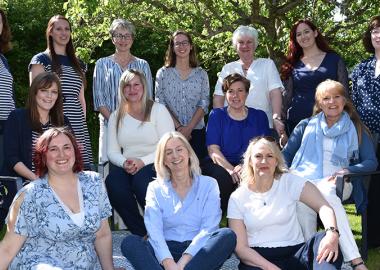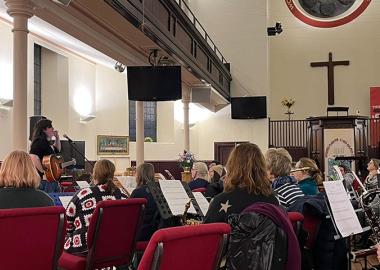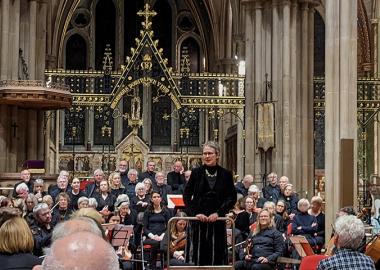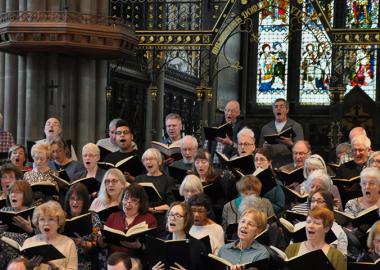Composer James Banner offers in depth reflections on collaboration as he meets with Two Rivers Concert Band for the Adopt a Composer project.
My previous experience doing music workshops has been with young people in schools or ensembles of young musicians. With these young people I have always found minds to be incredibly open to new ideas, receptive and responsive; the smallest (non-musical) stimuli can result in the most amazing interactions and results, opening my own mind and reminding me what it’s like to have an imagination.
Some of my favourite artists, musicians and composers are those who retain the childlike in their work, who aren’t afraid of humour and surprise, and who are uncompromisingly honest. As we get older we sometimes worry about asking questions or are afraid to say things that might be perceived as strange or unnecessary.
I see this development in myself and the others around me in the ‘real world’ outside of music, and believe it’s a natural progression informed by experience. So as I was approaching the days before my first workshop with Two Rivers Concert Band, I was naturally a little apprehensive as to whether my first ever workshop with grown-ups, full of life experience, experienced musicians of great concert band repertoire, would be accepting of my collaborative approaches or not; would they challenge them? I hoped that they would. Would some refuse to take part altogether? I hoped not!
My aim for the workshop was to get to know each other personally and musically - what kind of personalities and musical voices were in the band that I might be able to feature in the final composition, what was their experience of improvisation, had they ever composed in collaboration with others, what did the instruments sound like when they weren’t all playing in their usual sections, what were some strengths and weaknesses in both myself as a composer and within the band? In addition to this, I wanted to challenge perceptions of what music can be, not by saying how and what ‘could’ and ‘should’ be played, but by exploring what can be shaped out of non-musical ideas, as well as trying to encourage interaction between members who may not usually sit next to each other or play together - anyone who has played in a large ensemble or orchestra will be able to tell you that the person sat 30ft in front of you is sometimes still a stranger after many months (and then there is the challenge of actually hearing them over the various noises coming from all around you!). This aspect was especially important to me as a lot of my own experience composing is with smaller chamber groups, and this sound world is something I want to explore in the composition for Adopt a Composer.
Above all I wanted it to be fun, and send the band away with a sense of achievement whilst having been outside of their comfort zones.
At the first composers meeting in London at the beginning of October, we shared lots of ideas and best practise between adoptees and their mentors, so I was full of ideas and inspiration from which to draw for the workshop. Without this meeting early on I can say that the whole process would have been a lot more difficult! It was great to learn from others and discover what had worked and what hadn’t in real-world situations. I had also already met with the band to listen and talk about themes for the piece some weeks before, as well as taking a look at a few of the local sites, so I already had some ideas about what I wanted to focus on - rhythm and small group playing.
As it turned out this group of lovely people completely shattered my expectations and all my worries were gone within the first 10 minutes, which was spent laughing our way through some word-based rhythm games (with many references to Ilkley Moor Bah’t ‘at). From then on, I felt that everyone was fully engaged, challenging themselves and supporting each other.
I could tell from the off that it was a very welcoming environment in which I could feel at home and be myself. This is more than any composer or guest in an ensemble could ask for!
After the rhythm games in the first half (and the necessary tea break), we set up the room in 5 small chamber ensembles of mixed instrumentation and size. Borrowing inspiration from fellow adoptee Nathan James Dearden, each group nominated a leader who I gave a word to represent through music using 2 other words which became 2 contrasting sounds, decided by the leader. The words I chose for each group were: windows, desert, coffee, fields and forest. The groups were then free to be as literal or as abstract as they wanted i.e. from representing the sound accurately through their instruments to representing a word with a seemingly disconnected sound, and everything in between. They were also free to use more than 2 contrasting sounds of they wanted to, however the important thing was to create a piece that was up to 1 minute long and worked by itself irrespective of the words, and for both the groups and their leaders to work collaboratively, providing real time feedback on notes and sound choices, rhythms, conducting methods, arrangements and orchestration. To add an element of fun, we kept the words a secret until the end - it was a great moment of realisation when the groups realised they had been playing ‘coffee’ or ‘forest’!
Having my mentor Emily Crossland on hand to provide advice and support was great - sometimes as a composer you are just not sure which direction to take or how to say something; this applies to both sitting down in front of some manuscript to compose the first notes right up until rehearsing the ensemble. Her professional experience, unique ideas and way of expressing them proved invaluable to the flow of the workshop. We discovered that some members with hearing difficulties were unable to hear their group leader because of the noise around them - ideally we would have rehearsed in separate rooms and then come together to share. This is something I will definitely take forward and consider for future workshops and the collaboration in general, as it is really important that every person feels that they can make a valuable contribution to what is happening.
The results of the session were astounding - I even commented in the rehearsal that we could use any of these short pieces for the première next year!
What impressed me the most was the way in that each group leader showed initiative and direction, whilst at the same time being open to the ideas of their group. We had a sharing of all the pieces and we experimented with some small modifications to each one, seeing how, for example, they would sound backwards, in different keys at the same time or with members placed around the room, then discussed how the whole creative process had gone. Reflecting on process is something I try to do in all my work, as it is a great way of learning and developing. The comments were overwhelmingly positive; it allowed the musicians to see different sides to playing music, both that of the composer and also of their MD Mike O’Farrell.
Some who had never before improvised or composed were creating brand new pieces of music based in improvisation, all within the space of ten minutes.
Spending this hour outside of the box proved a great experience for me and the band and left me feeling inspired and encouraged, and the feedback I received from some members was that they enjoyed being outside of their comfort zones whilst also having a very clear direction to work towards. For the next workshop in 2019, I hope to draw on the ideas we explored this time and also bring along some more concrete ideas and sketches to try out before we go full steam ahead towards the première!
Follow composer James Banner on Twitter.
Follow Two Rivers Concert Band on Twitter and Facebook.
Keep up to date with Making Music via Twitter and Facebook, and join fellow members in the online community.










